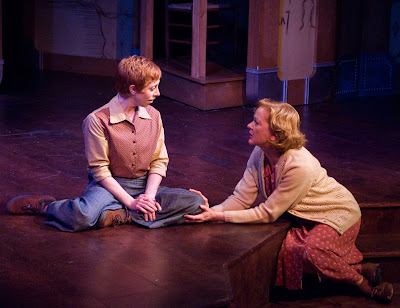By Hap Erstein
The year is 1946. World War II is over and the residents of Monroe, Wash., are eager to move on with their lives.
Except for teenage tomboy Mezzulah Steiner, who is intent on holding onto her wartime “Rosie the Riveter” job on the assembly floor of the local Boeing aircraft plant. The other women in town dutifully head back to their kitchens or resume making babies, but spunky Mezzulah not only clings to her job, she yearns to help design the planes that she has become proficient building.
The title character of Michele Lowe’s new play,
Mezzulah, 1946, now on at Florida Stage through Jan. 18, may be small in stature, but she is the sort of larger-than-life lass that seems to leap straight out of a musical, and not just because she usually has a vintage pop song on her lips.She is an iconic young feminist, ahead of her time, adamant about her right to do a job that others think should go to a war veteran instead. Worse yet, her employment could cost the Boeing plant some lucrative, job-adding contracts. No wonder the rest of Monroe wants her to give in and give up, for the good of the town, the company and, perhaps, the country.
If this sounds like it adds up to a strident play of social politics, that is not what playwright Lowe — who penned the intricate, multi-threaded
String of Pearls, seen in Manalapan three years ago — has in mind at all. Instead, she creates a world on whimsy and occasional fantasy, as she sketches in the townsfolk surrounding Mezzulah, including the ghost of her father, a mythic war widow who travels from cemetery to cemetery in search of her lost spouse, and Mezzulah’s aunt, preoccupied with raising money for a memorial to Monroe’s war dead, even though there is only one casualty.At times, these tangential characters threaten to pull focus away from Mezzulah, but gradually they form a patchwork community worth caring about, with concerns and struggles not that different from those we face today.
Still, Mezzulah is the heart of the play, largely because of the winsome Theo Allyn, who originated the role last year at Pittsburgh’s City Theatre. She manages to make the character very appealing, while also suggesting what an annoying pain she can be. Also standing out in the large cast — well, by Florida Stage’s standards — is Deborah Hazlett (The Count) as Mezzulah’s mom, struggling with allowing herself to find romance again after 20 years, James Denvil as the object of her tentative affections and Scott Borish (End Days) as Mezzulah’s chess-playing spectral father.
Director Louis Tyrrell renders this world with affection, glossing over some of its potentially cloying elements, and moving it along effectively on Richard Crowell’s slide-out sets, decorated with bits of the notebooks of Leonardo Da Vinci — Mezzulah’s inspiration
. Although it loses a few points for neatness, Mezzulah, 1946 eventually coalesces into an evening worth savoring.